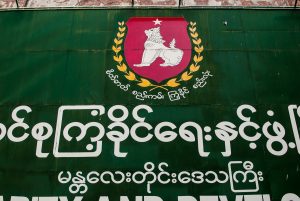In the final days of campaigning before Myanmar’s November 8 election, the ruling National League for Democracy (NLD) has drawn criticism from two very disparate quarters.
To start with, November 2 brought the interesting news that Sen. Gen. Min Aung Hlaing, Myanmar’s powerful military chief, had accused State Counselor Aung San Suu Kyi’s administration of “weakness and deficiencies” in its management of the election.
In a statement issued on November 2, the general claimed that the Union Election Commission (UEC), a body appointed by the NLD government, had mishandled voter lists, ballot envelopes and ballot boxes. Min Aung Hlaing also said the UEC had struggled to get political parties to observe special restrictions introduced due to the country’s recent alarming surge in COVID-19 infections.
“Although the Union Election Commission had over four years of preparation time for the 2020 election, there is much weakness even in arranging envelopes for votes and ballot boxes,” said the army chief.
“Based on the experiences of the 2010 and 2015 elections, the coming 2020 election should have greater freeness and fairness. But weakness and deficiencies which were never seen in the previous elections are appearing now.” These deficiencies, he added, could have “adverse impacts on the image of the election.”
At the last election in 2015, Aung San Suu Kyi and the NLD, harshly repressed for years under junta rule, trounced the military’s proxy, the Union Solidarity and Development Party (USDP), and won control of government for the first time. The USDP has similarly failed to inspire much support this year in the face of Aung San Suu Kyi’s staggering levels of popularity in the country’s ethnic Burman heartland.
One need hardly point out the irony in the Myanmar army – which ran the country as a military dictatorship for more than half a century – complaining about that the election will fall short of being free and fair. Nor the fact that the Tatmadaw drafted the 2008 constitution under which it is guaranteed 25 percent of seats in national and regional legislatures. It is also curious that Min Aung Hlaing cares about the image of the election, given that United Nations researchers have alleged his involvement in genocide and ethnic cleansing, in connection with military’s vicious assaults against the Muslim Rohingya populations of Rakhine State.
Myanmar’s government also drew fire from the opposite end of the spectrum of political opinion on the country’s affairs. On November 3, an independent United Nations human rights export called on the authorities to stop persecuting supporters of the opposition ahead of the election.
Thomas Andrews, the U.N. special investigator on Myanmar, expressed concerns about the denial of the vote to Rohingya Muslims and other minorities. He accused the Myanmar army of using a colonial-era penal code to “lock up journalists, students and others for exercising their basic right to free expression.” Last month, the government arrested more than a dozen students who were protesting the ongoing conflict in Rakhine State between the Myanmar military and insurgent Arakan Army.
In comments to the U.N. Human Rights Council, Thomas Andrews previously argued that the election could not be considered free and fair as long as the besieged Rohingya minority was prevented from participating. “The results of an election cannot accurately reflect the will of the people, when the right to vote is denied because of a person’s race, ethnicity or religion,” Andrews said.
While it has become increasingly apparent that Myanmar’s election is seriously flawed, both in its structures and its implementation, neither criticism is likely to matter much when ballots are cast on November 8. As Ben Dunant argues in these pages today in his detailed preview of the election, the poll is likely to help consolidate Myanmar as “an illiberal, majoritarian democracy, in which the government is increasingly responsive to majority demands, but where the only protected minority interest is the military, which still controls key security ministries and retains a quarter of all parliamentary seats.” This makes it even more strange that Sen. Gen. Min Aung Hlaing would take issue with the conduct of the poll. It also suggests that Aung San Suu Kyi’s popularity is so widespread that she needn’t pay attention to critics of Myanmar’s election, whether foreign or domestic.

































